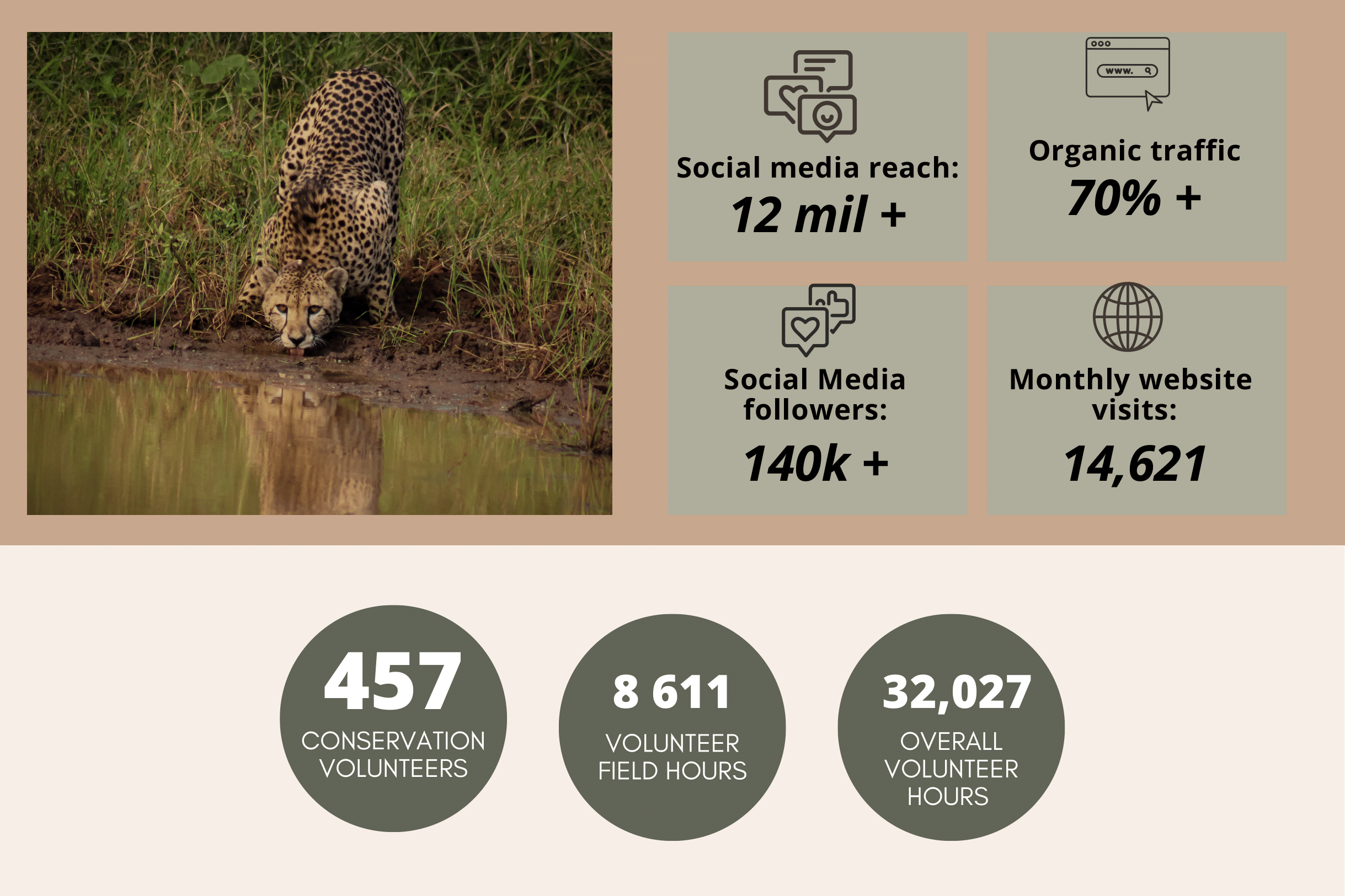
In 2023, Wildlife ACT continued to provide intensive daily wildlife monitoring support to six KwaZulu-Natal Protected Areas. This included a combination of government, private, and community-owned Protected Areas, thereby providing a holistic approach to endangered species monitoring in the region.
Our focus on endangered and priority species continued to include African Wild Dogs, Vultures, Cheetah, Lion, and more; with over 3,700 visual sightings and over 11,400 hours spent in the field in 2023.

Wildlife ACT won first place for Best for Nature Positive Tourism at the WTM World Responsible Tourism Awards.
Wildlife ACT won first place for Best for Nature Positive Tourism at the WTM Africa Responsible Tourism Awards.
We hosted five conservation safari experiences for various families and sponsors, supporting African Wild Dog collarings, Pangolin Monitoring, and Rhino horn trimming operations.
We merged our Conservation Training Course with our Staff Training for practical skill development and developed further opportunities with university student groups for conservation training.

Species Reintroduction: In collaboration with partners, we successfully reintroduced Wild Dogs to uMkhuze Game Reserve, contributing to the preservation of this endangered species. This effort helps maintain biodiversity and ecological balance in the region.
Translocation and Collaboration: We assisted in the translocation of the Tembe Wild Dog pack to Gorongosa National Park, showcasing the importance of collaboration across stakeholders. Our partnership with Mpilo Private Game Reserve led to the addition of Wild Dogs to their species list, the first reserve to do so since 2015.
Monitoring and Data Gathering: Our ongoing monitoring and data collection efforts, including fitting 11 collars over the past year, provide valuable insights into Wild Dog populations and movements. This data supports informed conservation decisions and actions.

In 2023, we expanded the KwaZulu-Natal Leopard Monitoring Programme with new surveys in various reserves across KwaZulu-Natal, providing invaluable insights into leopard populations.
Enhanced Understanding of Vulture Movements: The Vulture Conservation Programme has made significant strides in understanding Vulture movements. Through daily monitoring of around 30 tracked individuals, we have gained invaluable insights into their behavior and migration patterns, aiding in their conservation. In Hluhluwe-iMfolozi Park (HiP) alone, our team monitored over 50 vulture nests, aiding in the conservation of these vital scavengers. This effort contributes to the preservation of the Vulture population and the ecosystem's health.
Successful Rehabilitation and Release: In a heartwarming achievement, we successfully rehabilitated five African White-backed Vultures that had been impacted by intentional poisoning. These Vultures were equipped with tracking units and released back into the wild in Zululand, contributing to the rejuvenation of the Vulture population.
Promoting Wildlife and Human Health: A major highlight is the launch of a pilot project aimed at encouraging the use of alternatives to lead-based ammunition. This initiative recognises the severe health consequences of lead ingestion, not only for vultures but also for other wildlife and humans. By advocating for safer ammunition options, we are working to protect both Vulture populations and public health.

Monitoring Support: Our ongoing support to Rhino conservation continues at strength and includes: professional Rhino monitoring, training, and protection through top-quality expertise and enhanced technology. Wildlife ACT highlights for 2023 include our reliable support towards the Hluhluwe-iMfolozi Park K9 Unit, region-wide veterinary, emergency and dehorning support, as well as essential Rhino-focused awareness and education.
Hluhluwe-iMfolozi Park Boundary Project: Fences are a Protected Area’s fundamental first line of defence, to prevent wildlife from moving into unsafe space and restricting poachers from entering. Over 2023, this project saw the contracting of 10 individuals who conducted a minimum of 14 patrols a month, along 23km of the Hluhluwe-iMfolozi Park fenceline.
In total, the teams conducted 851 patrols equalling approximately 2,979 duty hours. This resulting in the rapid report of 27 incidents of fence cutting, 16 potentially problem-causing animal breakouts, and the removal of 12 wire snares.
Effective Conflict Resolution: Our programme's field observations helped identify and address 302 wildlife or potential human-wildlife conflict situations. This proactive approach led to the timely reporting of incidents such as dead livestock and fence damage, facilitating faster response and resolution.
Poison Response and Vulture Protection: We responded to and decontaminated poison from 10 incidents, saving Critically Endangered African White-backed Vultures. Additionally, we initiated a pilot project to promote alternatives to lead-based ammunition, mitigating risks to Vultures, other wildlife, and humans.
Our programme facilitated workshops that allowed community leaders and livestock owners adjacent to protected areas in Zululand to engage with Park Management. More than 140 participants discussed challenges, livestock husbandry improvements, and human-wildlife conflict avoidance measures, strengthening community relationships and conservation efforts.

First and foremost, Wildlife ACT exists to save our endangered wildlife and wild places from extinction, and are working tirelessly 365 days a year to achieve this goal. Integral to this, is establishing new protected areas for conservation throughout Africa in the face of rapid urbanisation.
Without your vital support, our work would not be possible - thank you.